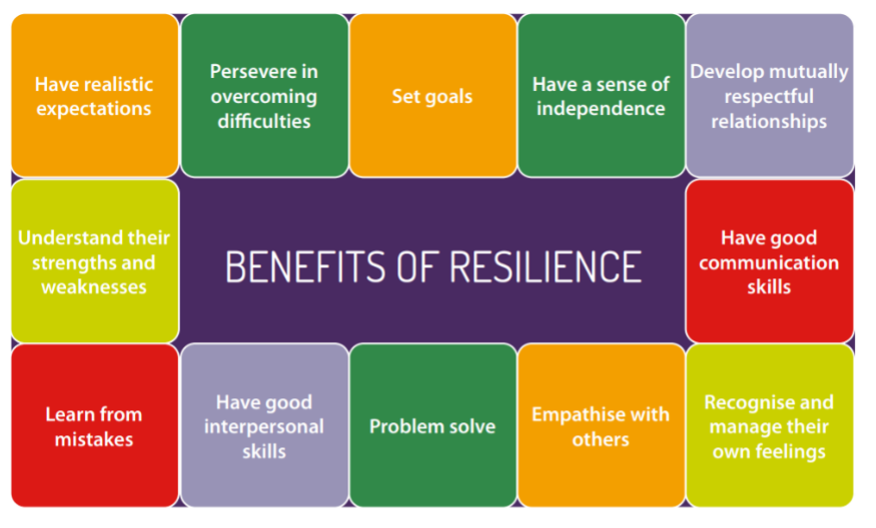Happy October
Our school’s theme this month is Resiliency and Perseverance. I believe these are two of the most important skills to develop. Without them, how can we face what life throws at us and still manage to keep going? These skills are key factors in protecting and promoting good mental health. I recently read that the opposite of anxiety is resilience, and I tend to agree with that statement.
It is important to note that resiliency is not about pretending everything is fine and remaining silent when things are challenging. Quite the opposite, in fact. We need to communicate our needs and feelings, ask for help when needed, and then find ways to tackle these challenges in a healthy manner.
There are many things we can do to help our children develop their ability to “bounce back” from hard things and grow in the process. Drawing from the American Psychological Association, here are 10 things towards which we can work.
- Make connections. Encourage your children to put their phones away in order to make real life connections with others. Teach them how to listen with empathy, hear different perspectives, and work through interpersonal challenges with respect and understanding. Relationships can be hard, and they take work. This work can be very humbling at times.
- Help your child help others. Find ways to use your child’s talents to help and support others. Not only does this boost their self-esteem and happiness, but it also gives them perspective on the lived experiences of others. Everyone has a story.
- Teach the Circle of Control. Help your child understand and focus on what they can control. This is an important skill that will serve them well both now and in the future. The Circle of Control includes the things you can control, the Circle of Influence includes the things you cannot control but can possibly influence with support, and the Circle of Concern includes the things you cannot control. (This Photo by Unknown Author is licensed under CC BY-SA-NC)
- Teach about self-care. Talk with your child about what it means to take care of ourselves. Model it! Encourage play, exercise, rest, mindfulness, and adequate nutrition.
- Nurture a positive self-view. Challenge negative self-talk and practice positive affirmations. (I have some affirmations written on my bathroom mirror, and my daughter likes to add to those). Recognize and celebrate your child’s successes and failures. Remind them of past struggles and how they got through those, even if it was really hard.
- Encourage your child to try new things. Better yet, encourage them to do something they think they are not good at. My daughter won’t go bowling because she says she’s “bad at it,” but I keep asking her to go. (I have to admit, this is something I need to work on myself and model better. I tend to avoid things at which I am not good. There is another goal for me!)
- Keep things in perspective. I say this with caution because we cannot determine what is a “small problem” vs. “a big problem” for someone else. We all experience emotions and sensations differently, and we need to acknowledge and validate all feelings first. Once our children are regulated, we can then talk about the problem. Sometimes I like to frame it as, “how much will this matter to you tomorrow, next week, next month, next year, etc.” Depending on their age, you can also talk about how much this present challenge will impact their future goals or how much it relates to their personal values and what really matters to them.
- Accept change. Teach your child that change is inevitable. Model this by responding to unexpected changes in an authentic and healthy manner. Remind your children that there are many things we cannot control. For our neurodivergent children, change can be very difficult. We need to acknowledge and affirm our child’s feelings and do our best to prepare them for the next time things don’t go as planned. Perhaps creating a mantra to repeat like, “I can accept change” will help or try connecting the situation to a passion area somehow. For example, if they love Ariel from The Little Mermaid, talk about examples from the movie where Ariel faced and accepted change.
- Move toward your goals. Teach your child to set reasonable goals and then help them to move toward them one step at a time. Establishing goals will help children focus on a specific task. This can build the resilience needed to move forward in the face of challenges. At school, break down large assignments into small, achievable goals and acknowledge accomplishments along the way to larger goals.
- Validate feelings without rescuing. Okay, take a breath. As parents, we want our children to be happy, so we tend to remove barriers and obstacles that get in their way. The problem with that approach is that we are sending the message, “you can’t handle this on your own!” When adults jump in to fix everything, it actually harms the child. It changes brain development and makes children more vulnerable. We stunt confidence and resilience. Children don’t learn how to problem solve or how to experience manageable stress and uncomfortable feelings. We know that those feelings aren’t dangerous, they’re just really yucky. So, what might this look like in practice? Well, it might mean sending our children to school when they are feeling anxious about something. It might mean having conversations about perspective-taking. It might mean saying something like, “that sounds really hard. What are some ideas you have to solve this problem?” It might mean not letting our children call home whenever they need reassurance (obviously, there are times we need to step in as parents when there is something harmful happening, but we need to remind ourselves that anxiety, for example, is not dangerous). And the list goes on. My mentor once said that children should do for themselves whatever is reasonable for their age and stage. That resonated with me. For example, have children pick out their clothes, do simple chores, pack their own lunch and backpack, order for themselves at restaurants, and advocate for their needs. All of these things encourage growth, confidence, and resilience.
For more information, download this toolkit.
The image below comes from this great resource.
Wellness Updates
Grades K-9
MindUp is in full swing. Students have been learning about their Mindful Brain and the stress response. They have also been practicing ways in which they can better regulate their emotions.
If you have questions about wellness programming in Grades K–9, please reach out to Dylan Dean.
Grades 10–12
Students have been discussing this very topic: Resilience and Perseverance. They have completed a questionnaire in hopes of identifying their strengths as well as the areas in which they may need to stretch themselves.
If you have questions about wellness programming in Grades 10–12, please contact me.
Counselling Services & Wraparound Support
We continue to have a counsellor supporting the needs of our learners in K–8. If you want to have your child connect with her, please reach out to Jenny Duffield.
I am here to support the needs of our Grades 9–12 students. If you want your child to connect with me, please send an email.
Lastly, if you have any questions or concerns regarding your child’s learning journey, you can also reach out to our Director of Learning, Erin Ellis.
Serena Braun
Registered Psychologist


